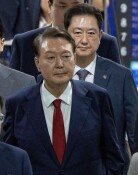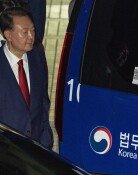[Opinion] Objectively Looking at Japan Deploying Troops Overseas
[Opinion] Objectively Looking at Japan Deploying Troops Overseas
Posted October. 25, 2001 09:20,
![[Opinion] Objectively Looking at Japan Deploying Troops Overseas](https://dimg.donga.com/egc/CDB/ENGLISH/Article/20/01/10/25/2001102505158.jpg)
Japan has steadily supported and offered full cooperation with the U.S. war on terrorism after the September 11 attacks on New York City and Washington D.C., and most recently passed `Bill For Special Measure Law On Terrorism` in the Lower House of the Japanese Parliament. The bill is expected to pass the Upper House by the end of October. A `Basic Plan` for Japan`s military support for the U.S. and aid for refugees, on which the bill is based, will be officially announced in November.
Of special note is that the bill expands the duties and objectives of the Japanese Self Defense Force. The SDF will be able to operate overseas in the name of international cooperation and will no longer be bound solely to the defense of the homeland.
Second, the SDF`s domain and scope of operation will increase. It will be able to perform missions over sea and air in foreign territory (Pakistan, for instance). The law will permit transportation and storage of food, medical, fuel and other material resources for aid, search and rescue operations, transportation of weapons and ammunition (but not on land).
Third, the law will weaken restrictions on use of weapons. The new law will have a two year lifespan.
In summary, a legal foundation has been established for deploying the SDF for backup support – actual military support - for the U.S. and other international forces. There are several causes and considerations that has led Japan to make the new law as a way to deal with the current situation. First, during the Gulf War ten years ago, Japan received only international disapproval and criticism despite its financial aid in the war effort. This compelled Japan to make a more visible contribution. Second, in making a contribution that corresponds to its capacity, Japan is displaying the desire to win international recognition and honor. This also falls in line with Japan`s cherished hopes of getting a permanent seat in the UN Security Council. Third, Japan is expressing its intention to strengthen the ally relationship with the U.S., which is motivated by the concern that a weak response may have damaged the relationship. Fourth, inasmuch as the attacks on September 11 was a challenge to the civilized world, Japan felt the sense of crisis and responsibility to participate in the international effort against terrorism. Fifth, there is the consideration that through the leadership of Koizumi Junichiro, Japan will demonstrate its crisis management skills and stabilize international politics. Sixth, the situation has awakened the Prime Minister`s and other central figures` sense of conservative,realistic values, intellectual orientation, global politics, and security. Seventh, September 11 and U.S. response to the attacks gave Japan the opportunity to elevate the status of the SDF, its tradition, and the sphere of operation. The picture of American and Japanese battleships sailing side by side with the American and Japanese flag flying next to each other may decide the outcome of the new law.
In actuality, what has made the new law possible is the merging of the terrorist attacks, the honorable cause of international cooperation, changes in Japanese society which are reflected in the Japanese people`s consciousness and the present political situation in Japan. The leadership of Prime Minister Koizumi Junichiro who has an overwhelming amount of public support, changes in the policy stance of the Socialist Democratic Party which has become a part of the ruling party, the mutual relationship between the Democratic Party and the SDP, the weakening of the traditional progressive forces, the generational changes in the political parties, and other significant societal changes lie behind the new law.
In looking at the special law, the Korean side has focused on the deployment of the SDF and is expressing concerns that this is a continuation of Japanese politics and government`s movement to the right and leading to a military state. However, explaining this as Japan`s amending the constitution, actual rearmament, and overseas military involvement is too simplistic. Such things will take place only in if there is a drastic change in Japan`s national security and the possibility of that happening is quite slim.
It is possible that there will be a change in policy where Japan proposes collective military operations in the near future. Implementations of so-called emergency laws and further alterations in SDF laws and other related laws will continue. However, formally amending article 9 of the constitution will remain a long-term difficult task for Japanese politics.
Kim Young-Jin (George Washington University Distinguished Professor, KyongHee University Guest Professor, International Politics)







